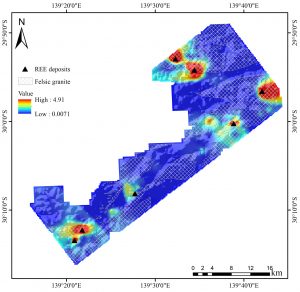An interesting seminar with Zijing Luo from the China University of Geosciences. In this EarthByte Seminar Series event, Zijing Luo will talk about “Prospectivity mapping of rare earth elements through geochemical data analysis and bespoke deviation network training.”
Seminar Details:
- Date: Wednesday, 01 May 2024
- Time: 11 am – 12 pm AEDT
- Location: Geoscience Conference Room 449, online
- Zoom Link: https://us05web.zoom.us/j/87355695575?pwd=iKG4P1VGFObnLfjvJO66CTzlJsaUbO.1&from=addon
Prospectivity mapping of rare earth elements through geochemical data analysis and bespoke deviation network training
Rare earth elements (REEs), a significant subset of critical minerals, play an irreplaceable role in modern society and are regarded as “industrial vitamins,” making them crucial for global sustainability. Geochemical data acquired through sampling a variety of media can reflect a wide range of geochemical and geological processes, proving highly effective in delineating metal mineral prospects. However, the distribution pattern of geochemical elements is the result of the long-term interactions among various processes, including primary and secondary geological processes, alongside human activities. Delineating the natural background levels and distribution patterns of REEs to distinguish them from geological-related natural variations, mineralization, and anthropogenic contamination poses a challenge. The Curnamona Province is considered an emerging REE province, with significant REE mineralization potential. This study focuses on the REE occurrences in the northern Curnamona Province and aims to investigate the applicability of geochemical data and machine learning methods in the discovery of potential greenfield regions for future exploration. The proposed integrated framework effectively imputes data, reducing the impact of the closure effect and outliers on multivariate statistical analysis. It also employs a deviation network to learn anomaly scores from complex nonlinear data under imbalanced data conditions, identifying geochemical anomalies associated with REE occurrences, leveraging prior knowledge. The framework provides valuable clues for future mineral exploration.

![]()

